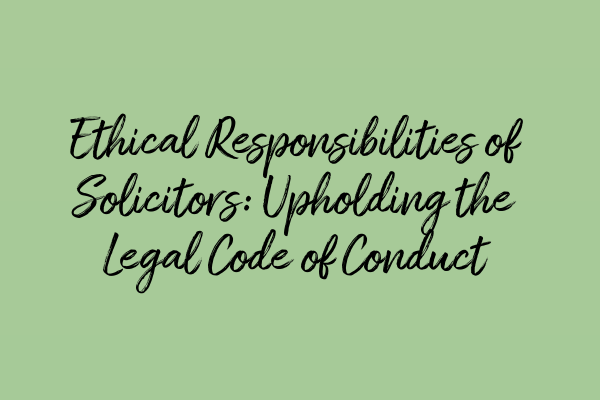Ethical Responsibilities of Solicitors: Upholding the Legal Code of Conduct
In the legal profession, solicitors play a crucial role as advocates for their clients, ensuring that justice is served and the rule of law is upheld. However, along with the privilege of representing clients, solicitors also have ethical responsibilities that they must adhere to. These responsibilities are defined by the Legal Code of Conduct, a set of guidelines that governs the professional behavior of solicitors in the United Kingdom.
What is the Legal Code of Conduct?
The Legal Code of Conduct outlines the ethical principles and professional standards that solicitors must follow in their practice. It is designed to maintain the integrity of the legal profession and ensure that solicitors act in the best interests of their clients and the administration of justice.
Some of the key ethical responsibilities outlined in the Legal Code of Conduct include:
- Client Confidentiality: Solicitors have a duty to maintain client confidentiality and protect the information shared by their clients. This means that solicitors are not permitted to disclose any confidential information without their client’s consent, unless compelled by law.
- Conflict of Interest: Solicitors must avoid conflicts of interest that could compromise their ability to represent their clients effectively. This includes situations where the solicitor has a personal or financial interest that may lead to a conflict in their duties.
- Competence and Diligence: Solicitors are expected to provide competent and diligent legal representation to their clients. This means staying up-to-date with changes in the law, conducting thorough research, and preparing cases diligently to provide the best possible legal advice and representation.
- Professional Conduct: Solicitors must uphold high standards of professional conduct in their interactions with clients, colleagues, and the court. This includes treating all parties involved with respect, honesty, and integrity.
- Financial Integrity: Solicitors have a responsibility to handle clients’ money and financial matters with honesty and integrity. They must maintain proper accounting records, handle clients’ funds appropriately, and ensure that any financial transactions are transparent and lawful.
Why are Ethical Responsibilities Important?
Adhering to ethical responsibilities is crucial for solicitors because it helps build trust and confidence in the legal profession. When clients seek legal representation, they place their trust in the solicitor to act in their best interests and uphold the principles of justice. By abiding by the Legal Code of Conduct, solicitors demonstrate their commitment to ethical practice and the pursuit of justice.
Furthermore, upholding ethical responsibilities is not only essential for the reputation of individual solicitors but also for the legal profession as a whole. Solicitors who act ethically and professionally contribute to the overall integrity and credibility of the legal system.
Consequences of Ethical Breaches
Failure to uphold ethical responsibilities can have severe consequences both for the solicitor and their clients. Ethical breaches can lead to professional disciplinary action, including reprimands, fines, suspension, or even disbarment. Moreover, clients may suffer harm if a solicitor fails to act ethically, such as breaches of confidentiality or conflicts of interest.
It is, therefore, imperative that solicitors always prioritize their ethical responsibilities and continue to strive for excellence in their professional practice.
Conclusion
As solicitors, it is not only our duty to provide legal representation to our clients but also to adhere to ethical responsibilities defined by the Legal Code of Conduct. Upholding client confidentiality, avoiding conflicts of interest, maintaining competence, demonstrating professional conduct, and ensuring financial integrity are fundamental aspects of ethical practice.
By embodying these ethical principles, solicitors contribute to the preservation of the legal profession’s integrity, strengthen trust between solicitors and their clients, and help maintain the rule of law in society.
Related Articles:


Leave a Reply